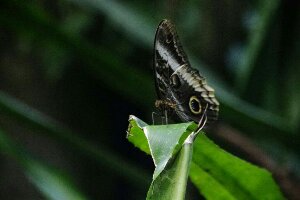We arose early to eat breakfast at 5:15 in order to be on the boat to Corcavado National Park, which is about an hour south of Drake Bay on the ocean. Together with a number of other guests from Cabinas Manolo we hopped onto the back of the truck for a ride to the beach. There we waded out to our boat, and after picking up another couple of people at another spot on the beach we were underway.
Our guide for the next two days, Neyer, unloaded the cooler containing our breakfast for tomorrow, and we carried our backpacks with today’s lunch, some snacks and our clothes to Sirena Station which was about a kilometer from where we’d landed on the beach. Along the way Neyer pointed out many of the plants and animals along the path.
As we arrived at the grassy clearing which is where the buildings for Sirena Station are located, a small plane buzzed right over our heads, and landed on the “air strip” (calling it an air strip is stretching the truth as it is two dirt ruts through the tall grass). “He’s crazy,” Neyer said of the pilot. Apart from the boat, the only other ways to get here are by walking about 20 km, or by taking this small plane from Puerto Jimenez.
After leaving our overnight supplies where we would be sleeping for the night, we headed off on a hike. We could hear the howler monkeys roaring not far away. We soon spotted some spider monkeys. It was information overload as Neyer pointed out to us all the many species of flora and fauna along our walk.
We stopped at the Rio Claro to eat our lunch. It was a very pleasant shady spot with a nice breeze that cooled us from the 30C heat and humidity of the morning. After lunch Neyer walked to try and find some tapirs, but wasn’t able to see any. After enjoying the break, while he told us much of the biology of the forest, and seeing some of the birds including a pair of scarlet macaws, we continued on the trail.
Not long after that we spotted two hikers fording the river. We talked to them as they dried their feet, while Neyer walked back across the river to once again look for tapirs. We found that the hikers were from Israel, and suddenly one of them exclaimed that he saw something. We looked and saw a tapir a couple of hundred meters towards the ocean, so we quickly walked that direction.. After looking around a bit we were able to get quite close to it as it ate the leaves of the hyacinths and grasses.
After we’d met up with Neyer once more we looked some more, but didn’t spot any further tapirs. However we did see literally hundreds of kinds of birds as we walked back to the station.
Enid was tired, so didn’t continue with us as Neyer and I walked to the ocean to see if we could spot a bull shark as it entered the mouth of the river at high tide. We were unsuccessful, but did see a number of monkeys preparing to rest for the night in the tops of the trees.
It was almost dusk by the time we got back to the station so Enid and I set up our tent for the night, along with more than 25 other campers under the roof of a large open building. We found a dirty old foam mattress, but it was the only one thick enough to give some comfort on the hard floor. We set it up in one tent, but when I went inside decided it would be much too hot. This tent had only a tiny screened door, so very poor ventilation. We found a much better tent and got our tent set up in time for supper.
The showers there weren’t very clean, and the three toilets were filthy by the end of the evening. We were very careful to make sure we used a lot of hand sanitizer, and I also doubled the water treatment for our drinking water. Supper for us was provided by the station personell. Their kitchen looked a lot cleaner than the one where many of the other campers were preparing their own food, so we hoped that the food would be safe.
We were both very tired so we fell asleep pretty quickly. The lights went off at 8 pm, and then it quieted down very quickly.

